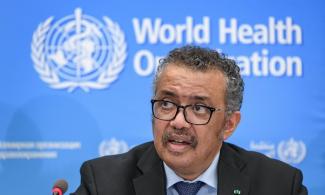
The Director of the WHO, Dr Tedros Adhanom Ghebreyesus, raised the alarm on Wednesday, during a press conference, describing the human catastrophe caused by the Sudan war as unimaginable.
Sudan is the world’s largest humanitarian crisis, with 12 million people displaced, the global health body, World Health Organisation (WHO) has revealed.
WHO added that 10 million people are internally displaced, while two million have fled to neighbouring countries.
The Director of the WHO, Dr Tedros Adhanom Ghebreyesus, raised the alarm on Wednesday, during a press conference, describing the human catastrophe caused by the Sudan war as unimaginable.
"First to a conflict that has been dragging on for many months, with tens of thousands killed, millions displaced and health services severely disrupted.
"I’m not talking about Gaza. I’m talking about Sudan – the war the world has either forgotten or ignored," Ghebreyesus stated in a text of the press conference shared on WHO's official X (formerly Twitter) account on Wednesday.
"Sudan is the world’s largest humanitarian crisis, with 12 million people displaced - 10 million internally, while 2 million have fled to neighbouring countries."
Describing the pitiable situation in the North African country, the WHO boss explained that more than 70% of hospitals in the conflict-affected states, and 45% of health facilities in another five states are not working, while the remaining ones are overwhelmed with people seeking care.
"People are dying from a lack of access to essential health services and medicines, while there is a very real risk of mass starvation in some regions.
"Critical services, including maternal and child health care, the management of severe acute malnutrition, and the treatment of patients with chronic conditions, have been discontinued in many areas," he stated.
Ghebreyesus further revealed the dire situation in the war-torn country had been worsened by disruptions to telecommunications which he said "are affecting disease surveillance and reporting, as well as our ability to verify attacks on health".
"We call for a swift restoration of telecommunication access across all of Sudan.
"As the situation in Sudan continues to decline, WHO is on the ground supporting lifesaving interventions and outbreak response.
"We provide expert advice, training and oversight to health operations, management of malnutrition, disease surveillance and outbreak response," he said.
According to WHO, it continues to distribute urgently needed medicines, medical supplies using all available avenues, including cross-border and crossline operations, to reach previously unreachable areas in Darfur and Kordofan, where the needs are greatest.
"With “breakthrough” deliveries, some areas that had not been reached this year have been reached.
"However, insecurity and operational hurdles continue to pose a challenge in the timely delivery of supplies and services.
"We ask you, the world’s media, to continue drawing attention to Sudan, and not to allow our world to forget it," he pleaded.